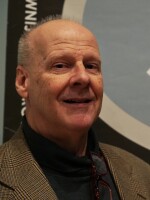April is National Poetry Month. Rockford poet Christine Swanberg has achieved national recognition in a career spanning several decades. So what did it take for her to become a poet?
First off, Swanberg says, she didn’t always know she would become a poet, or even that she could become one.
“Since I was raised in the era where women could be teachers, nurses or secretaries, it didn’t occur to me to write until I had been teaching creative writing for five or six years. And I realized I had a burning desire to write,” she says.
So, she started to take different classes. It took a while, she says, for poetry to emerge as her main focus. At last, in the early 1980s, she took a sabbatical from her teaching to study at Northern Illinois University with world-renowned poet Lucien Stryk.
“And that made a big difference in my life. And that’s when the poetry began to be my parallel universe, so to speak, with teaching,” she says.
After that, Swanberg says, she didn’t waste any time sending her work out into the world.
“My thought was I’d waited long enough to write, and I wasn’t going to write another ten or twenty years to sending the work out to see what would happen. And as it turned out, I had a lot of beginner’s luck, and that pushed me forward,” Swanberg says.
Swanberg’s poems were accepted in magazines, and to her complete surprise, she won a contest held by Midwest Poetry Review. But since then, she says, it hasn’t always been that easy. That’s when she found out whether she had what it takes, not just to write poems, but to be a poet.
“And I realized that I could be disciplined and write almost every day if I had to, because I enjoyed it so much,” she says.
Swanberg says that was true when it was new to her, and it still is today. Enjoyable or not, she says it’s still a lot of a hard work.
Swanberg says it took several more years to figure out the things she would write about, what she would NOT write about, and how she could compose her thoughts in her own distinctive way.
“And that’s when classes are really good, because other people see things that you don’t see in your work, and particularly if you’re studying with a master such as Lucien Stryk. The way I would describe it is sort of like taking a bath with Lava soap: you get really, really clean, but it’s not exactly altogether pleasant,” Swanberg laughs.
Swanberg found her voice, and has achieved success. She’s published several books of her poetry over the years, and appeared in numerous anthologies and magazines. She’s retired from teaching, but expects to continue writing the rest of her life.
So does she have any advice for others? First she says, explore and experiment, and learn all you can about poetry past and present. Take classes. But after the apprenticeship, she says, don’t be afraid to put aside the critiques, and take the next step.
“You know, there’s only so many conferences you can go to. So many classes that you can take, before it’s time for you to do it. You know, it’s you, you have to do it,” she says.
And find your own way, and your own voice.



